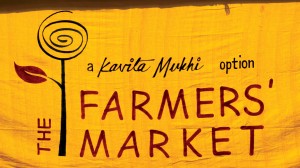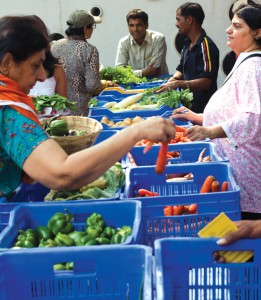 The term ‘organic’ now greets us everywhere, from supermarket aisles to magazines and TV adverts. Appreciation of the actual benefits of organic food for our bodies and our planet is not fully understood. The buzzword does require certification to the highest standards of environmentally friendly farming. At the Farmer’s Market in Mumbai, the community buzz is evident and delicious smells saturate the air. I met with Kavita at the market cafe, eyeing the plates of organic fare I passed.
The term ‘organic’ now greets us everywhere, from supermarket aisles to magazines and TV adverts. Appreciation of the actual benefits of organic food for our bodies and our planet is not fully understood. The buzzword does require certification to the highest standards of environmentally friendly farming. At the Farmer’s Market in Mumbai, the community buzz is evident and delicious smells saturate the air. I met with Kavita at the market cafe, eyeing the plates of organic fare I passed.
What initially motivated you to organise the event?
Following the birth of my son, I was confused by all the information available on nutrition, so I studied and then taught the subject. However, I felt that people really needed someone to be proactive, so I founded a store that sold organic dried goods. I then branched out to fruits and vegetables and started the market, which has now been running for two years.
Recently, my main motivation has been to resist and petition against the Genetic Modification of foods and seeds in India. I also strive to aid farmers in getting the right price for their produce, to encourage farming families to pass on their valuable skills to future generations before the knowledge disappears forever.
What hurdles do you face now?
I work in partnership with 2000 farmers; however, I can only have 20 per event. There is the potential to organise many more markets, but as space is at a premium in Mumbai, the main hurdle will always be the cost and availability of appropriate spaces. We do receive sponsorship from a few companies, but not enough to grow at present.
 Have you noticed a shift in attitudes toward organic food?
Have you noticed a shift in attitudes toward organic food?
Absolutely. People want organic food; however, they do initially find the price high. I often explain that when you buy organic, you are not just paying the price of a potato, you are supporting someone’s livelihood. We are so used to paying ridiculously low prices for food that farmers simply cannot afford to survive. We are losing the next generation of rural farmers to other professions. With that, we lose a part of our heritage if we don’t change our behaviours and priorities.
People are prepared to pay a premium when they go out to eat, yet refuse to pay slightly more for basic foods, irrespective of their quality. What encourages me however is seeing people at the market who are happy in the knowledge that they are taking home safe food to their families.
What else should people be aware of to spend more on organic food?
Firstly, the produce is all very fresh as it is harvested every Saturday and brought to the market Sunday morning. Secondly, all the money that is made from selling the produce goes directly to the farmers. Thirdly, and most importantly, the taste of the food is superior.
The market provides a place to engage socially with likeminded people. People bring their own bags and we try to arrange some sort of cultural activity every week. Additionally, all the waste from the market is taken back to the farms to be used as compost.
Some think eating organic food is a status symbol. What is your take?
We consciously attempt to educate people on the real benefits of eating organic produce through leaflets at the entrance. I would agree that a fundamental shift is only possible if the majority of people are on board, including those in a position of influence like celebrities. What people fail to realise is that organic food is not a new concept, but rather a rebirth of traditional farming methods. Maintenance and support is required in order for it to continue. Today, shoes are sold in air-conditioned shops and fruit and vegetables at the side of dirty roads. This is our opportunity to change that.
It’s refreshing that, in a busy world of convenience, there are people who still make time for the simple things. So, whether you want to learn more about organic food, or simply want a place to eat lunch on a Sunday, pop along to the Bandra Farmers’ Market for a truly organic experience.
Volume 1 Issue 10































